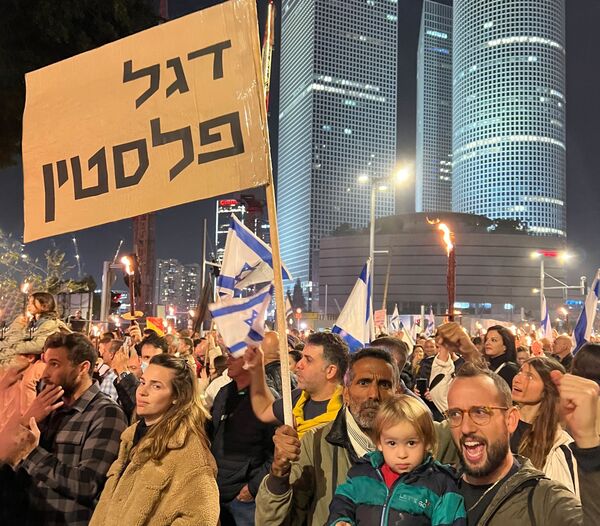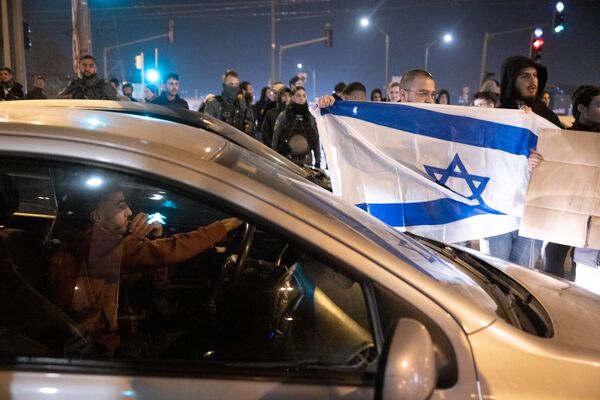Newsletter
Jan
31
2023
Welcome to the Tuesday News Bulletin! Every Tuesday, we publish original reporting on Israel/Palestine by our staff and contributing writers, which goes directly to our newsletter subscribers. The Tuesday News Bulletin also serves as a forum for aggregating stories Jewish Currents staffers are tracking, with plenty of links to other publications so you can keep up with everything happening on our beats.
This article is by Jewish Currents senior reporter Alex Kane.

Israeli activist, poet, and comedian Yossi Zabari holds a sign that reads “Palestine flag” in Hebrew at a January 21st anti-government demonstration in Tel Aviv.
Rachel Stolero
January 31st, 2023
A few days before the weekly anti-government demonstration on January 21st in Tel Aviv, an organizer with the Movement for Quality Government in Israel, one of the main groups behind recent opposition protests, reached out to the Israeli activist, poet, and comedian Yossi Zabari and invited him to speak at the event. Zabari was intrigued and inquired whether he could bring a Palestinian flag with him to the speakers’ stage. The organizer said no, according to Zabari. “We want the messages delivered from our protest to be only about the democratic character of Israel,” Nadav Lazare, a spokesperson for the Movement for Quality Government, told Jewish Currents.
As a result, Zabari declined the speaking role. Instead, he went to the protest with a sign reading “Palestine flag” in Hebrew, which he intended as both a commentary on National Security Minister Itamar Ben-Gvir’s directive to the Israeli police to ban the Palestinian flag from public spaces and as a provocation against the wider protest movement’s discomfort with the flag. The sign caught other demonstrators’ attention. “People would come up to me to take a picture—not a selfie, but a picture, because they don’t want to be involved in the message of the sign itself,” said Zabari. “One man came to me and said, ‘I’m not marching for Palestinians.’ I said, ‘Well I am. I march for democracy and democracy is for everybody.’ Another lady said, ‘They’re gonna think it’s a demonstration for lefty people.’”
The reactions to Zabari’s sign—and the denial of his request to speak with a Palestinian flag in hand—reflect the prevailing sentiment in Israel’s anti-government demonstrations this month. The large weekly Saturday night protests in Tel Aviv, Jerusalem, Haifa, and other cities are a response to the right-wing government’s plans to curb the Supreme Court’s power by allowing a Knesset majority to override court decisions and to give politicians, rather than legal professionals, the ability to appoint judges. In many protesters’ eyes, this far-right assault on liberal norms in Israel-proper has little to do with Israel’s system of control over Palestinians—a stance that alienates Palestinian citizens of Israel and the broader anti-occupation left, and reflects the protests’ alignment with a center-left politics that typically ignores or passively accepts Israel’s 55-year military occupation.
“The protests don’t mention anything that has to do with the Palestinian issue,” said Sami Abu Shehadeh, a former Israeli Knesset member and the leader of the Palestinian nationalist party Balad, in an interview with Jewish Currents. “The issues that are brought up have nothing to do with the main problem in the region—justice and equality for all the people living here.” Saturday’s opposition protest included a moment of silence for the seven Israeli Jews killed by a Palestinian gunman in an East Jerusalem settlement on Friday, but there was no mention of the 35 Palestinians killed by Israeli soldiers so far this year. “Our movement is not a political movement,” Lazare told Jewish Currents. “We don’t have a formal stance on the Israeli–Palestinian issue.” Instead, Lazare said, the movement is for anyone who cares about democracy in Israel, adding that “the protest should be as large as can be.”
In response to this approach, anti-occupation organizations such as Standing Together and Looking the Occupation in the Eye have organized a few hundred demonstrators—most of them Israeli Jews—to show up waving Palestinian flags and holding anti-occupation banners. “Using the Palestinian flag in demonstrations has become a symbol for resisting a regime of Jewish supremacy,” said Dana Mills, a long-time anti-occupation activist who works for the human rights group Gisha but was speaking in a personal capacity. While Lazare said his organization has no issue with any protester waving the Palestinian flag, other protesters have taken offense to seeing them. Some holding flags have been grabbed or attacked, according to a +972 Magazine report; others have had their flags snatched away. A video from a January 14th protest in Jerusalem shared by one activist Twitter account shows the Israeli police attacking a protester who, the tweet said, had been waving the flag.
Some protesters say they oppose the use of the Palestinian flag not because of outright opposition to the anti-occupation cause, but because they fear that the Israeli right will use images of Israeli opposition protesters waving the flag to delegitimize their movement. In an incident witnessed by a Haaretz reporter, one demonstrator asked someone picking up a sign with Israeli and Palestinian flags on it to “please leave [the signs]” because others would “take a picture of it and say that it’s a Palestinian demonstration.” Indeed, right-wing social media users in Israel have taken to posting pictures and videos of protesters with Palestinian flags to portray the opposition as traitors. “The flag is equated with terrorism, with violence,” said Mills. “The problem is the opposition protests go with the mainstream that is leading that discourse, rather than opposing it.”
Given the Israeli Jewish nationalist tenor of the protests, few Palestinian citizens of Israel have participated, said Sally Abed, a Palestinian citizen of Israel and a member of the national leadership team at Standing Together, a progressive Jewish-Palestinian group that organized the first opposition protest in Tel Aviv on January 7th. “The Ashkenazim, the academics, the middle class, the centrists, the secular—these people who are going on the streets right now have a very strong sense of ownership over this country,” said Abed. “Palestinians don’t have that feeling of agency, especially in a shared space, where we just don’t feel like we are part of Israeli society. It feels like this is a fight for Jewish democracy—not for democracy [for all].” Yet Abed still thinks it’s worth it to try to organize Palestinian citizens at this moment because, she said, “Palestinians are the first and most targeted group by this new government.”
Avner Gvaryhau, co-director of the anti-occupation group of Israeli veterans Breaking the Silence, also argued that this a moment for the anti-occupation left to bring their politics into the opposition protests. “Speaking about occupation is key in my view because there’s no world in which any sort of liberal or progressive camp in Israel will ever form without including Palestinian Israelis, without acknowledging the wishes and wants of the left, both Jewish and non-Jewish,” he said. “It’s both the right thing to do from a moral standpoint—we are talking about 20% of society that needs to have a place in the marketplace of ideas—and from a political and tactical standpoint [in order to increase this camp’s] numbers.”
While some on the left fear the protests only aim to shore up an already unjust system—the Supreme Court has at times legitimized Israeli occupation tactics, recently ruling, for example, that the army could displace over 1,000 Palestinians in Masafer Yatta—Gvaryahu said the demonstrations still pose an opportunity. “I believe in entering wherever there’s a crack,” he said. “Once there’s a conversation about democracy, it’s not that big of a jump to start talking about the lack of democracy for others. We have to connect the dots between the military dictatorship we have over millions of Palestinians and the fear of a right-wing dictatorship over the rest of Israel.”

Israeli settlers block Palestinian cars at the entrance to the Jerusalem neighborhood of Shuafat on January 28th to protest recent shooting attacks in Jerusalem that killed seven and injured at least five. Israeli police protected the settlers while taking action against Palestinians. At least one Palestinian was arrested. Settlers also blocked roads and harassed Palestinians at major junctions in the West Bank.
Oren Ziv/Activestills
As part of the Tuesday News Bulletin, Jewish Currents is publishing a photograph taken by members of Activestills every week, archiving ongoing dispossession and resistance from the river to the sea. You can find more information on this collaboration here.
- In response to the two shootings in East Jerusalem by Palestinian gunmen over the weekend, the Israeli government announced a series of retributive policies targeting Palestinians. On Saturday, Israel’s security cabinet voted to strengthen Jewish settlements, demolish the home of the shooter responsible for the killing of seven Israeli Jews, and advance legislation to revoke the social security benefits of families of attackers.
- Settler attacks sharply escalated following the shootings in Jerusalem, with the Palestinian news agency Wafa reporting that there were 144 incidents of settler violence on Saturday alone. That included an assault on a Palestinian man in Masafer Yatta; the throwing of stones and the torching of a house and a car in two villages close to Ramallah; and the destruction of 200 olive trees in Nablus, according to a Washington Post report. In addition, an armed Israeli settler shot and killed an 18-year-old Palestinian named Karam Ali Salman on Saturday night outside the northern West Bank settlement of Kedumim. The Israeli army said Salman was armed with a pistol.
- The Palestinian Authority (PA) announced Thursday that it had cut off security coordination with Israel following the Israeli army’s January 26th raid in Jenin that killed nine, making it the deadliest single raid since 2002. The PA last ended security coordination—which involves intelligence sharing and cooperation between Israel and PA forces in order to halt Palestinian militant attacks against Israeli targets—in 2020, in response to the Israeli government’s since-abandoned plan to annex West Bank settlements. It’s still unclear what the latest end to security coordination will actually mean in practice.
- Last week, Sarah Margon, a senior employee at Open Society Foundations and formerly the Washington director at Human Rights Watch, withdrew from consideration to be the State Department’s assistant secretary for democracy, human rights, and labor. Republican Senator Jim Risch blocked a vote on her appointment for over a year because of a past tweet Margon made applauding Airbnb’s since-reversed decision to ban rentals in West Bank settlements. “At present, I don’t see a path forward for confirmation, and after one-and-a-half years, it’s time to move on,” Margon said in a statement.
- Congressman Jerry Nadler, the most senior Jewish member of Congress and one of the Democratic party’s most prominent supporters of Israel, wrote in a Haaretz op-ed last week that he is concerned the US–Israel relationship could be harmed because of the Israeli government’s plans to overhaul its judicial system. “The alliance between our countries is, in large part, rooted in these high democratic principles. I fear deeply that this critical relationship could be irrevocably strained should Israel move forward with the Justice Minister [Yariv Levin]’s proposed anti-democratic judicial amendments,” Nadler wrote. Echoing Nadler’s concern, Eric Goldstein, head of the New York Jewish Federation, said Friday in an email to federation supporters that he was “alarmed” by the plan. “The current proposed legislation raises dramatic concerns,” said Goldstein. “It eviscerates the role of the judiciary by allowing Supreme Court decisions to be struck down by the barest majority of the Knesset— undermining the very foundations of Israel’s democracy and subjecting all minority groups to the tyranny of the majority.”